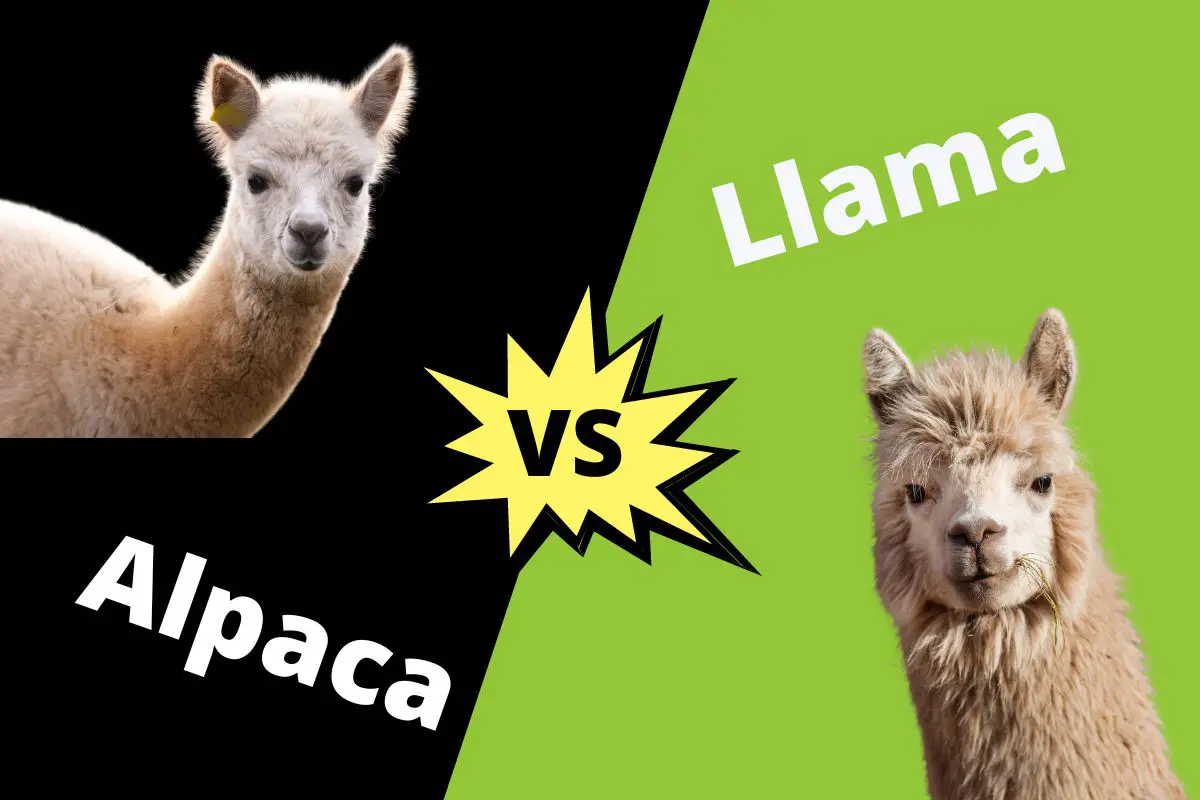The primary difference between alpaca and llama is size. Alpacas are smaller and weigh around 150 pounds, but llamas are much bigger and weigh about 400 pounds.
Alpaca and llama are often used to refer to the same animal, but there are key differences between them. It can be difficult to tell the differences between these two camelids.
Table of Contents
Difference Between Alpaca and Llama
| Alpaca | vs | Llama |
| Vicuna | Ancestors | Guanaco |
| South America | Origin | South America |
| Alpacas are smaller, and an average alpaca weighs approximately 150 pounds | Size | Llamas are bigger in size and weigh about 400 pounds |
| Camelids | Species | Camelids |
| Short, round face with lots of hair | Face | Longer face with less hair |
| Short, straight, and pointed ears | Ears | Long, curvy, and banana-shaped ears |
| Alpacas have a very fine and soft coat | Coat | Llamas have a coarse coat. But baby llamas have softer coats like alpacas |
| Black, white, red, gray, roan, brown, fawn, pinto, rose, etc. | Coat color | White, red, gray, brown, beige, etc. |
| Yes | Hypoallergenic fur | Yes |
| Shy and prefer to stay in the herd. Usually polite but may spit or kick when feels threatened | Nature | Llamas are energetic, social animals and don’t easily get threatened. Llamas also spit, kick, hiss, or lie down when they feel threatened. Fur and meat Used forUsed for fur meat, as guards for livestock, and also to transport goodsGrass hay, foliage, and grains DietGrass hay, foliage, and grains |
Breed History and Ancestors
Both alpacas and llamas are part of the camelid family and have been bred for more than 50,000 years. Alpacas can be separated into two breeds– Suri (soo-ree) and Huacaya (wah-kl-ah). Suri alpacas have straight and silky fiber, while Huacaya alpacas have fluffy and wooly fiber.
People bred alpacas for their wool while domesticating llamas for transporting goods, trekking, and meat.
Both the alpacas and llamas are found mainly in Bolivia and Peru. Most alpacas live in the central and southern parts of Peru, whereas llamas have occupied the mountains of Bolivia.

Size
As mentioned earlier, size is the main difference between alpacas and llamas. Alpacas are smaller, weighing between 120 to 150 pounds, and stand 34 to 36 inches tall. But llamas are bigger, weigh approximately 400 pounds, and grow 42 to 46 inches tall.
Fiber and Coat
Alpaca Coats
Alpacas have a fine, smooth, soft fiber or coat compared to the coarse coat of llamas. Alpacas produce soft, thick, and dense fiber, which is also lanolin-free and hypoallergenic as opposed to sheep wool.
Alpaca wool is used for making clothing items like shawls, hats, socks, blankets, sweaters, and other woolen garments.
Llama Coats
Llamas have two coats. One is softer and remains underneath the rough, coarse overcoat, and separating the two coats is tricky.
Due to the coarse texture, llama fiber is used mainly as cushion filling, rugs, ropes, etc. But the baby llama fiber is as soft as alpaca fiber.
Face
You can also differentiate between an alpaca and a llama by looking at their faces. Alpaca’s faces are short and round with lots of hair, while llamas have longer faces with less hair.
Ears
Alpacas have short, straight, and pointed ears, while llamas have long, curvy, and banana-shaped ears.
Color
Alpacas have multi-color coats ranging from white, black, brown, roan, grey, red, fawn, pinto, rose, and more. You can find alpacas in 22 different colors.
In contrast, llamas have solid color coats and patterns like red, white, gray, brown, beige, etc.
Temperament
Alpacas are shy animals and prefer to stay in the herd, but llamas are confident animals. Llamas don’t easily get threatened when they come across any predators.
Farmers usually keep llamas as guard animals for their alpacas. Llamas can live peacefully with a herd of alpacas.
Alpacas are generally gentle animals with a very docile nature. Still, they will spit, kick, hiss, lie down, and refuse to move if they feel threatened.
Llamas are pretty assertive and rude, and they spit quickly when they get offended.
Alpacas and llamas also spit while fighting over food or trying to establish dominance in the herd. Also, both animals use a humming sound to communicate with each other.
Domestication
People have domesticated alpacas and llamas for thousands of years. Alpacas have always been valued for their soft fiber for making clothes.
Even though llama wool is not as soft as alpaca wool, llamas are great as guard animals. Llamas also serve as pack animals due to their large and robust bodies, and people have used them for ages to transfer stuff.
Natives from the Andes Mountains used packs of llamas to transfer goods through rough terrains. If you need to move goods through terrains that require hiking, llamas are best for that purpose.
Lastly, people have always loved alpaca and llama meat, one of the other purposes behind herding the Camelidae.

Both of these domesticated animals are helpful in their ways. They have been supporting human civilization for years by providing fleece and meat and helping to transport goods. Now that you can differentiate between these two camelids, check out our post comparing lynx and bobcats.

